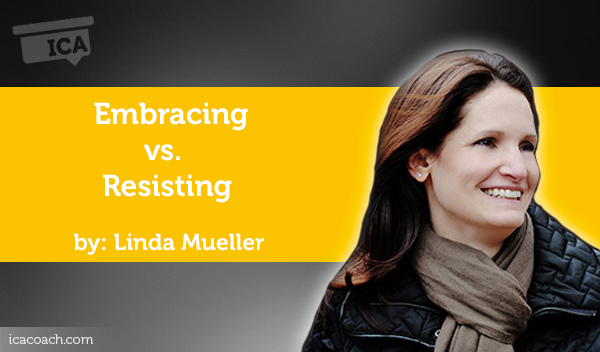
A Coaching Power Tool created by Linda Mueller
(Expat Spouse Coach, JAPAN)
Reading
Often, individuals are resistant to change out of fear – the fear of the unknown, the fear of the effort required to change, the fear of failure. New ideas or a potential change are often given a negative connotation before they are fully understood. Resistance can cause stress and result in missed opportunities that may lead to regret.
If we change our mindset to be open to new change, we live in a world of possibilities. By realizing that we can often shape and shift that which we embrace, positivity will abound. Embracing is not accepting. It is more. Embracing is active and powerful. Accepting is passive and potentially weak. When we embrace a change, we own it and influence it, even if the only influence we have is over our own reaction.
Eckhart Tolle eloquently states the benefits of not resisting life:
To offer no resistance to life is to be in a state of grace, ease, and lightness. This state is then no longer dependent upon things being in a certain way, good or bad. It seems almost paradoxical, yet when your inner dependency on form is gone, the general conditions of your life, the outer forms, tend to improve greatly. Things, people, or conditions that you thought you needed for your happiness now come to you with no struggle or effort on your part, and you are free to enjoy and appreciate them – while they last. All those things, of course, will still pass away, cycles will come and go, but with dependency gone there is no fear of loss anymore. Life flows with ease.
Shifting from Resisting to Embracing
When life presents us with a change, which can also be a challenge, we have a choice. We can embrace the situation and make it our own. Doing so puts us in a position of power. Or we can resist and let life happen – be it good or bad. This is passive, at best, and often weak. While Eckhart Tolle suggests that we must lose our
inner dependency on form
to live at ease, this is a state that many of us need a great deal of work to achieve. A small step in that direction is shifting from resisting to embracing when we are faced with a change. This will take effort initially, but with practice it will become a natural instinct.
Self Awareness
Realizing that we are resisting a change is the first step in making the shift. Despite changing circumstances, we may find ourselves sticking with routines that are no longer appropriate, using language that is negative, wasting effort on working against the change, and so forth. In short, we are acting as if nothing has changed even if it has or will. Feeling stressed, fearful, annoyed and powerless are all symptoms or resistance.
Assessing the Situation
What am I actually resisting? Why am I resisting it? How does it make me feel? What do I still need to learn about this situation? Asking yourself these questions help you begin to shift from a place of blind resistance to embracing, and therefore influencing, the situation…putting you in a place of power.
Making the Shift
Becoming aware of resistance and truly understanding what you are resisting will open you up to realizing that you have options or at least the ability to influence, even if it is just your own reaction to a situation. You can then analyze the situation and your reaction on a deeper level and put an action plan in place to address what you were previously resisting.
Reflection
Case Study
Jason and Susan are a dual income couple with two active children; Sam (10 years) and Jill (14 years). Jason is on the executive track at a Fortune 100 company and Susan is on the partner track at a prestigious domestic law firm. They have very full lives in the USA. In addition to their challenging careers, they are very involved in the local professional community and in their children’s school and extracurricular activities. Both Jason and Susan’s extended families live close by and they have a wide circle of personal and professional contacts, which they really enjoy. Susan, an only child, recently learned that her mother is terminally ill and realizes that her father will need a great deal of support moving forward. Other than the family illness, Susan, Jason and their children enjoy their full lives – embracing their current lifestyle.
One Friday evening, Jason came home from work and announced to the family that his company had asked him to take a 3-5 year assignment in Tokyo, Japan. This was a big promotion for Jason, who would be leading the company’s largest subsidiary. He was also excited about the enriching opportunity that this assignment would provide his family. In addition to the cultural experience, the financial benefit of being an expat would provide an extra cushion for college and retirement savings. He was so energized that he announced that he would leave within two weeks and the family would leave three months later after school ended for the summer before he realized that he his news was being met with blank stares.
Jason stopped speaking at the same time everyone else began chiming in:
Susan: Darling, I’m so proud of you, but what about my career, the children’s schooling, all of our friends and MY PARENTS? (Later and in private, Susan also brought up concerns regarding the safety of Tokyo.)
Sam: I’ll visit you in Tokyo, but I’m not leaving my friends and my school AND I have sports camp in NY this summer!
Jill: I’m NOT going – PERIOD! (runs away sobbing – mumbling about hating sushi)